Arts & Entertainment
Rippin’ & tearin’ & strippin’
Melissa Etheridge on Wolf Trap and why drastic health steps should be weighed carefully
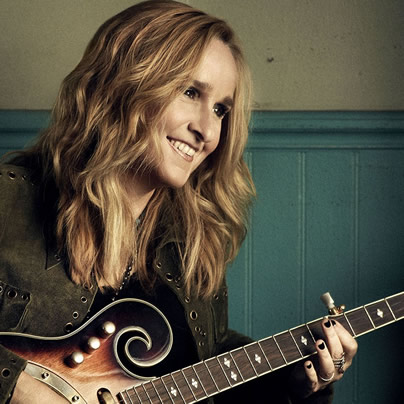
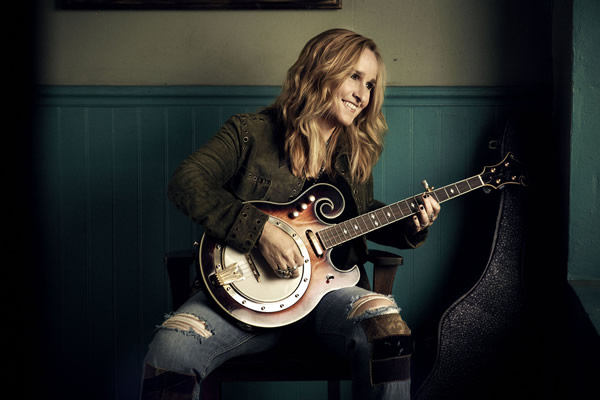
Melissa Etheridge (Photo by James Minchin III)
Melissa Etheridge
With guest Eric Hutchinson
Tuesday
8 p.m.
Wolf Trap
Filene Center
1551 Trap Road
Vienna, VA
$35 (lawn)-$65
wolftrap.org
When we talked to Melissa Etheridge last year the conversation turned — as one might expect in an election year — to politics. So this time we focused on music. The lesbian rocker plays Wolf Trap Tuesday night. Her comments have been slightly edited for length.
WASHINGTON BLADE: Last time you were here you played the Strathmore, which is kind of stately, whereas Wolf Trap is outside and more earthy. Does the venue affect the kind of show you play?
MELISSA ETHERIDGE: Yes, totally. One of the things I do before I even write out a set list is I go stand on stage and look out and really get a feel for what the venue is like. Is it indoors, outdoors, is the first row up close, will people be able to stand, are they soft seats, hard seats? I’ve been touring for 25 years so I’m very conscious of what kind of show can be produced at each place and it does make a difference in what songs I play. This will definitely be different from the Strathmore show. I love playing Wolf Trap and I don’t think I’ve ever sweated as much on stage as when I’ve played Wolf Trap. It was just so humid last time I was there, I was really soaked even before the show. But yeah, it’s gonna be much more rock and roll out there.
BLADE: How do you manage to do those big rock money notes year after year? Rock singing, of course, often doesn’t use proper vocal technique that they teach you in classical singing and some singers get vocal cord nodules while others, like Tina Turner perhaps or many gospel singers, seem to be able to growl and howl for decades on end with no problem. Have you ever strained your voice letting it rip so to speak?
ETHERIDGE: I learned a long time ago playing in bars how to make that growly rock and roll sound but not harm the vocal cords. It’s not really screaming, it’s like a stage scream. That and having a good understanding of how not to tax the voice too much in doing that style of singing, also helps. I usually don’t sing more than three night in a row. I can do four, but it will start to wear down after awhile and the shape of my voice is definitely related to everything. If I’m tired, if I haven’t eaten right, if I’m stressed, all those things affect it. But as long as I can eat right and sleep well, I can be on the road and do the rock and roll stuff out there every night.
BLADE: How have you found the right balance throughout your career of knowing when to play up the all-out rock stuff versus having enough of a commercial, pop/AC vibe on your various projects to get some radio and mainstream exposure? Have you given much thought to those sorts of things as you’ve been writing and recording various records?
ETHERIDGE: Yeah, it’s been a big part of understanding radio and the music business in general and then just when you kind of have a handle on it, of course it changes much like it did in the mid-‘90s when I was really at the pinnacle of it. As it should — young kids grow up and they have their own stuff and I get that. I stopped, I guess around the turn of the century, trying to make my music for radio because I think that would just have been selling myself out and I realized I had a strong live audience that was not going away and would still come see me play, so I really dedicated myself to making the music that I love and not trying to be so much pop. Which is fine — I mean, I love a good pop song like everybody else does, but I don’t limit myself to that anymore. The most important thing in my mind when I’m writing and recording is how is this going to translate to the live stage. That’s more the guideline.
BLADE: And yet many veteran acts who have that loyal fan base have great numbers the first week out with a new album and like you said, do fine filling decent-size venues, yet without any radio traction, the albums can come and go so quickly it seems. Has there been any frustration with that at various times? Any sense of a diminishing return for all the hard work?
ETHERIDGE: Well yeah, of course you always hope there’s maybe something there radio can hold on to a little and you would always like to make your record company a little money, that’s always nice. Yet I really have learned to let it go because I think the music does sort of manage to find its own way. I just stumbled on some online music site where these two rock critics were saying my last album “4th Street Falling,” that if it had been released by some up-and-coming singer, it would have really represented kind of the future of rock and roll or something so yes, there is sometimes an advantage to being not as established but I wouldn’t trade where I am at all to be up and coming. I’m very happy with where I am overall and I feel I have a great deal of industry respect and I’m fine with that.
BLADE: You’ve been on Island your whole career, which is almost unheard of in this day and age. I’m sure the whole staff has changed since you started …
ETHERIDGE: Not a single person is still there from then.
BLADE: How have you navigated all the changeover?
ETHERIDGE: It’s funny, there was a joke a few years ago there that everytime I had a new album out, “Oh, watch out, Melissa’s got a new one, there’s going to be a complete regime change.” Different times my options have been up we’ve looked around and, you know, Island and Def Jam and Universal — it’s one of the biggest labels there is. I always felt I had good relationships there so why not? The whole business has changed so much, it’s nice to stay someplace if you can.
BLADE: Last time you played here, the album was just out. Do you feel freer to sing more of it live now that it’s been out awhile and people have had time to let it sink in or do you skew more hit-heavy for the summer shows?
ETHERIDGE: Last fall I did kind of the “4th Street Falling” tour and I did a lot of new stuff but at that stage, I’m still listening to the new stuff, experimenting a bit and finding out which songs seem to pop more live. So I kind of play the new stuff and see which cuts were really fun for the audience and they tend to stay in the show. But yeah, it’s a summer show — we’re going to be doing all the hits too. We’ll be singing “Come To My Window” at the top of our lungs.
BLADE: You had so many great TV duet shows over the years in terms of collaborations with other artists — Joan Osborne, Sophie B. Hawkins, Jewel, Dolly Parton. Any of those especially stand out in your mind?
ETHERIDGE: Well singing with Bruce Springsteen was a dream come true. It was like, “Oh, please let time stop.” That one and singing with Dolly was just one of the greatest things that ever happened to me. I felt like our entertainment ethics were the same. She’s such a great entertainer and we kind of threw things back and forth. It felt like a good game of one on one.
BLADE: One that I really remember was when you sang “You Can Sleep While I Drive” as a duet with Amy Grant. Here she was this gospel singer singing a sweet duet with you, which sort of gave it a lesbian undercurrent. It seemed kind of shocking at the time. Do you remember how that came about or if there was any hesitation in her camp to do it?
ETHERIDGE: Trisha Yearwood had covered that song sometime in the ‘90s, so it had kind of been in the country world, then when Amy came in and we were talking about songs we could do, she said, “Well, I want to sing ‘You Can Sleep While I Drive.’” I’ve sang that with more people than any other song. It just kind of lends itself to that harmony duet feeling. I’ve known her for a long time. I met her in Europe back in ’88 and have been friends with Vince too. You know she kind of went through her own tabloid-y thing but she’s just so open and very very easygoing so that wasn’t even part of it. It was just like, “Let’s sing together and just enjoy it.”
BLADE: How prolific have you been in the studio over the years? Did you overcut tracks for very many of your albums? Is there going to be a killer Melissa Etheridge box set of outtakes and rareties someday?
ETHERIDGE: I can’t believe you asked that because yes, I’m working on that right now. The record company came to me and said, “You know, it’s been 25 years, let’s put out a box set.” But I didn’t want to just say, “OK, here’s my songs again.” I think my fans will enjoy some of these other things so I started going back into the vaults and into my storage space and found some tapes I hadn’t even remembered. So it’s going to be eight CDs and there’s live tracks, covers, solo demo tracks, a recording of me made when I was 14, everything that didn’t make it onto an album, pictures and videos. I even found a TV show I did back in 1982 in L.A.
BLADE: ETA?
ETHERIDGE: I don’t know the exact date right off, but it will be in November.
BLADE: Where do you keep your Grammys, platinum albums and Oscar?
ETHERIDGE: I have a lovely office I share with my gal, Linda.
BLADE: You and Linda (Wallem) are still together?
ETHERIDGE: Oh yes, yes, yes. I finally got it right. It’s a bunch of things. It’s a grown-up relationship.
BLADE: As a breast cancer survivor yourself, what did you think of Angelina Jolie’s announcement?
ETHERIDGE: I have to say I feel a little differently. I have that gene mutation too and it’s not something I would believe in for myself. I wouldn’t call it the brave choice. I actually think it’s the most fearful choice you can make when confronting anything with cancer. My belief is that cancer comes from inside you and so much of it has to do with the environment of your body. It’s the stress that will turn that gene on or not. Plenty of people have the gene mutation and everything but it never comes to cancer so I would say to anybody faced with that, that choice is way down the line on the spectrum of what you can do and to really consider the advancements we’ve made in things like nutrition and stress levels. I’ve been cancer free for nine years now and looking back, I completely understand why I got cancer. There was so much acidity in everything. I really encourage people to go a lot longer and further before coming to that conclusion.
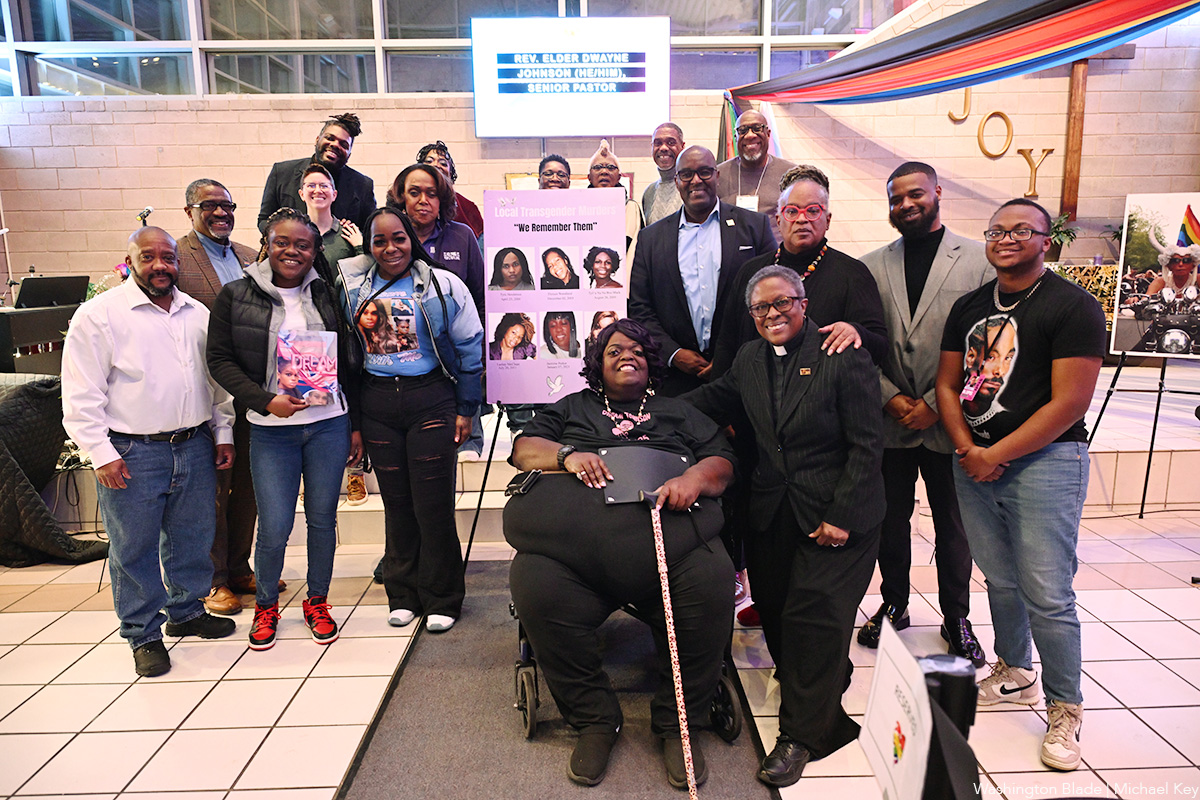
Transgender Day of Remembrance was observed at the Metropolitan Community Church of Washington, D.C. on Thursday, Nov. 20. The event was emceed by Rayceen Pendarvis and Dwight Venson. Musical selections were provided by Agape Praise and Dynamic Praise. Proclamations from the D.C. Council and the D.C. Office of the Mayor were presented. The Pouring of the Libation was conducted by Rev. Elder Akousa McCray and Rev. Paul Fulton-Woods of Unity Fellowship Church. Remarks were given trans survivors of violence. Family members of slain trans woman Dream Johnson were featured speakers. Prayers were given by Rev. Cathy Alexander and Rev. Dwayne Johnson of Metropolitan Community Church of Washington, D.C. Yael Shafritz gave a Jewish prayer through a video presentation. Closing remarks were given by community leader, Earline Budd.
(Washington Blade photos by Michael Key)
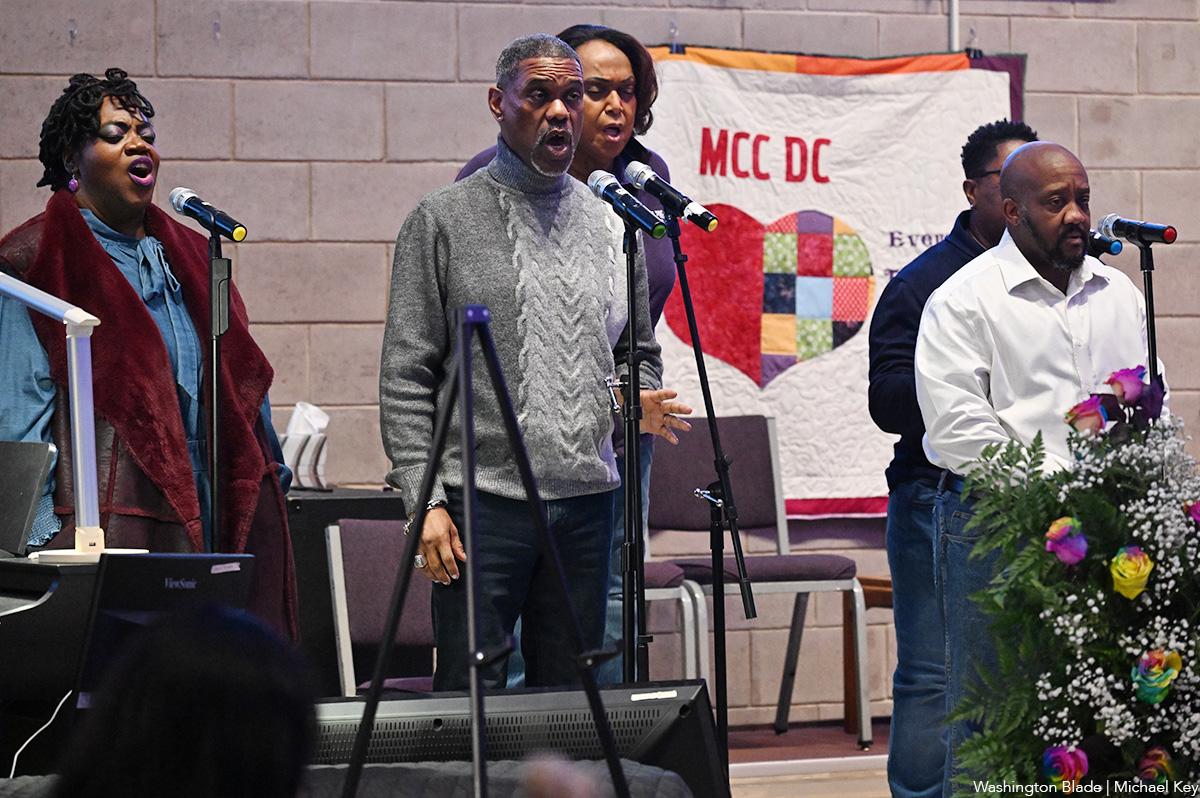
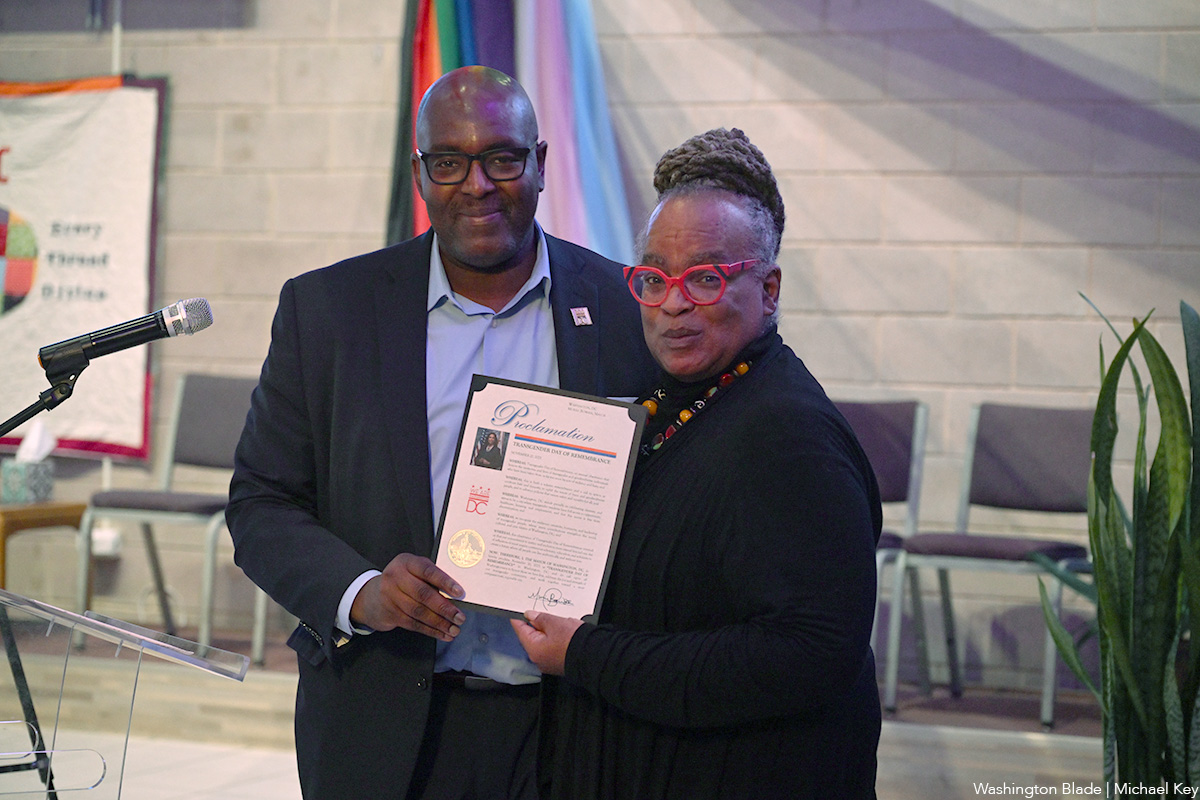
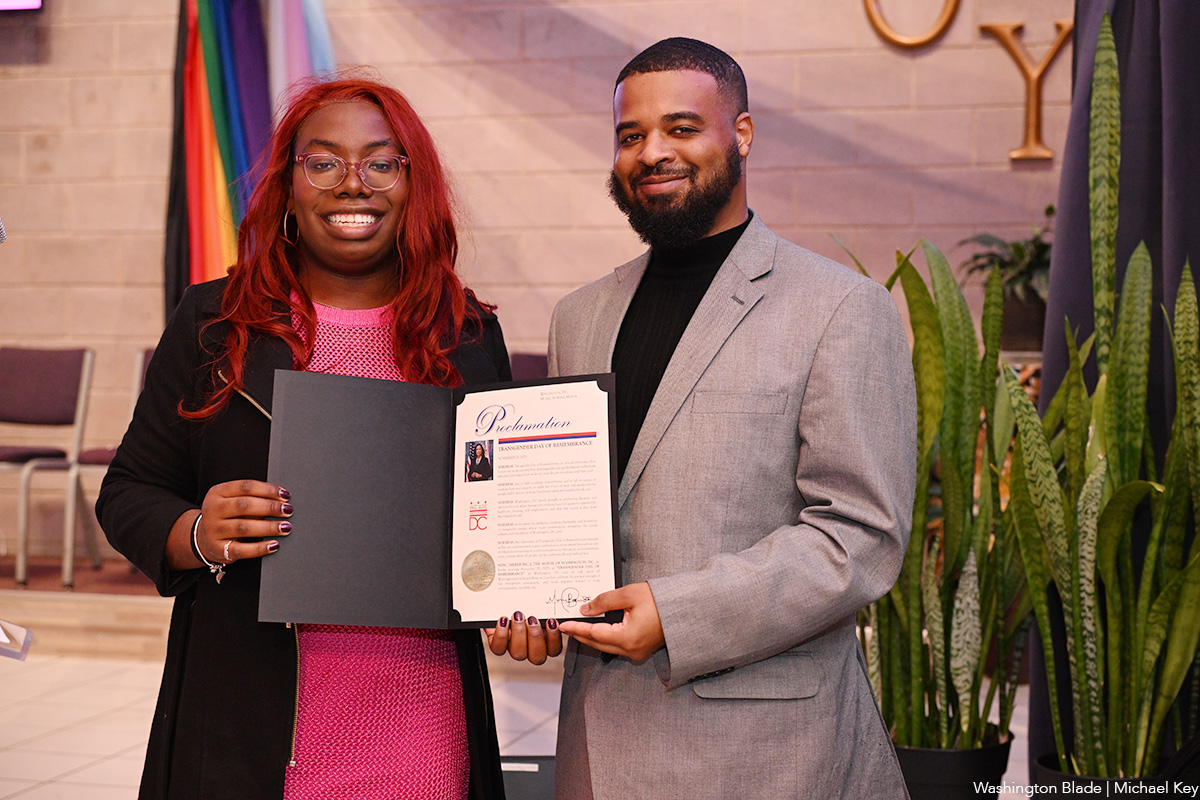
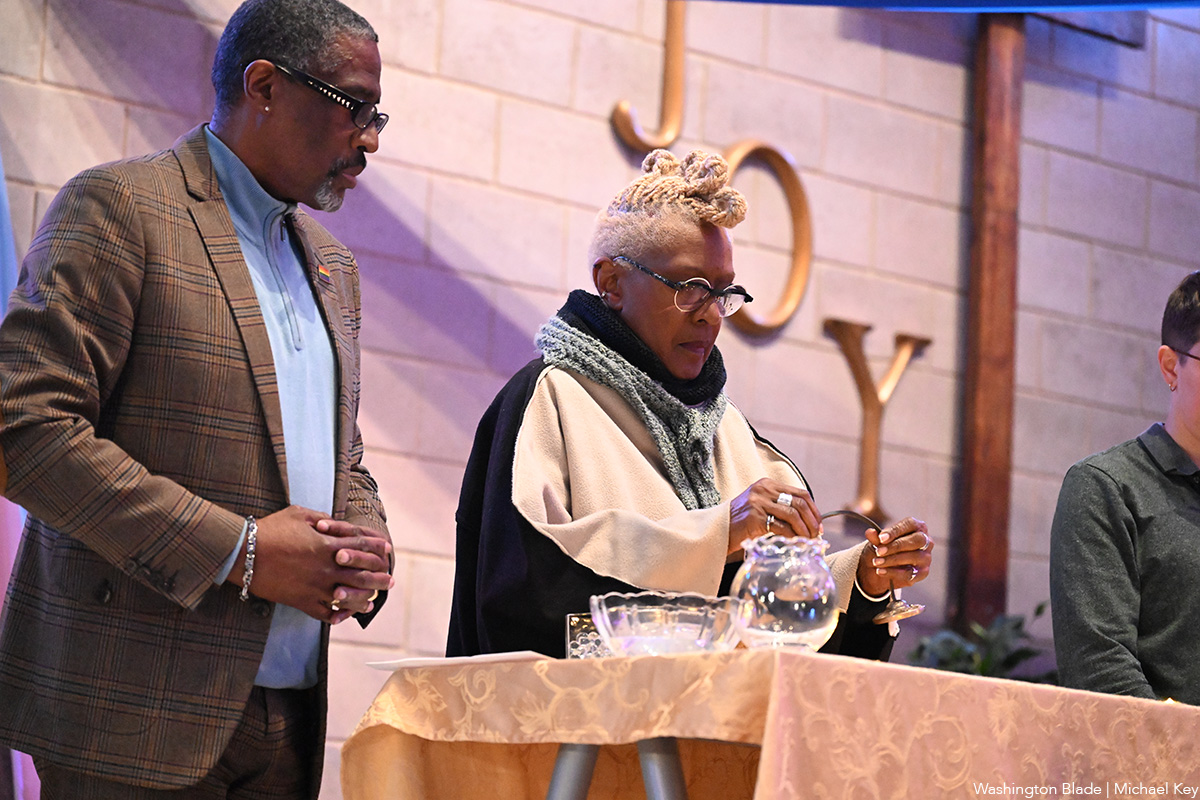
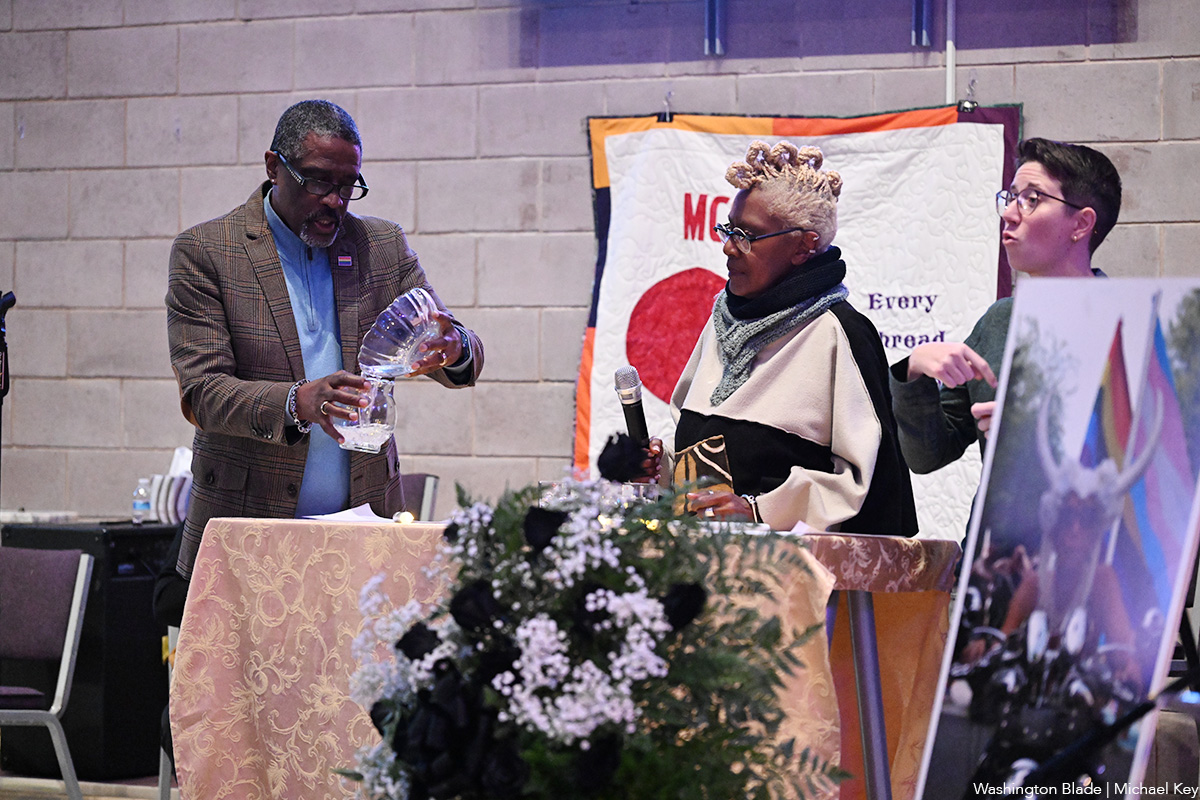
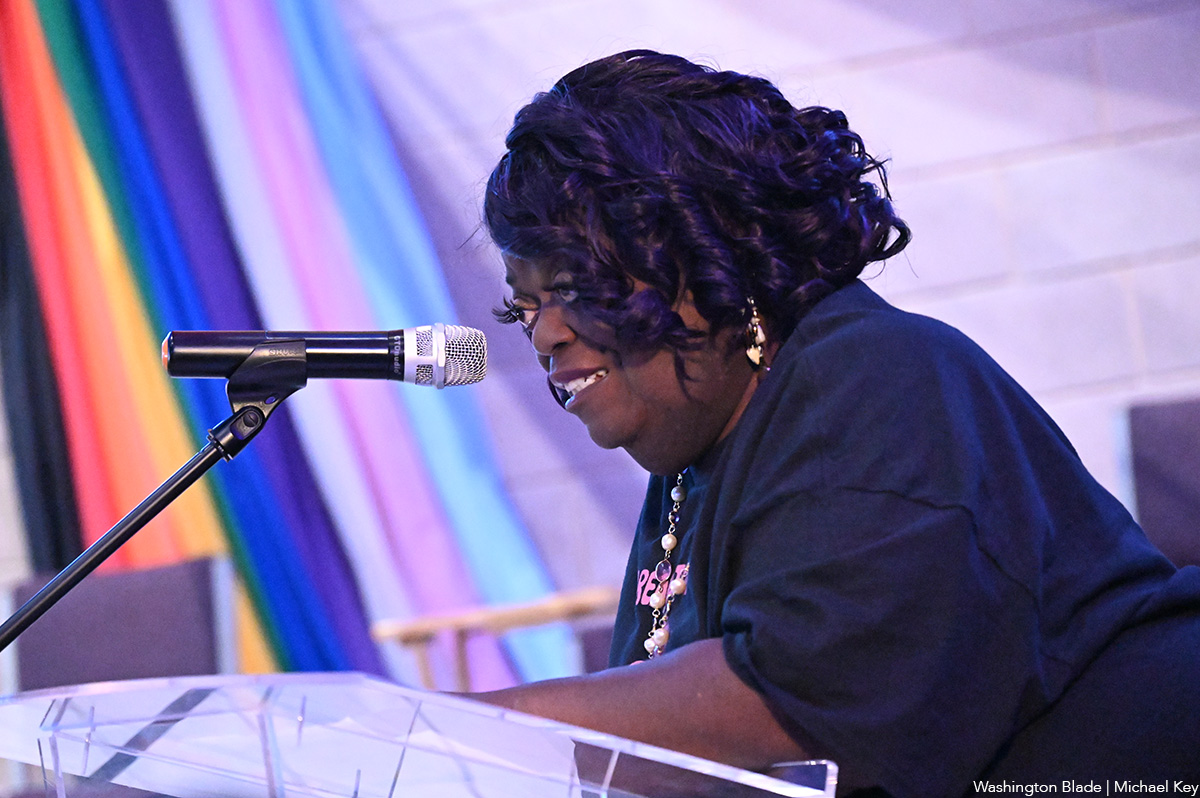
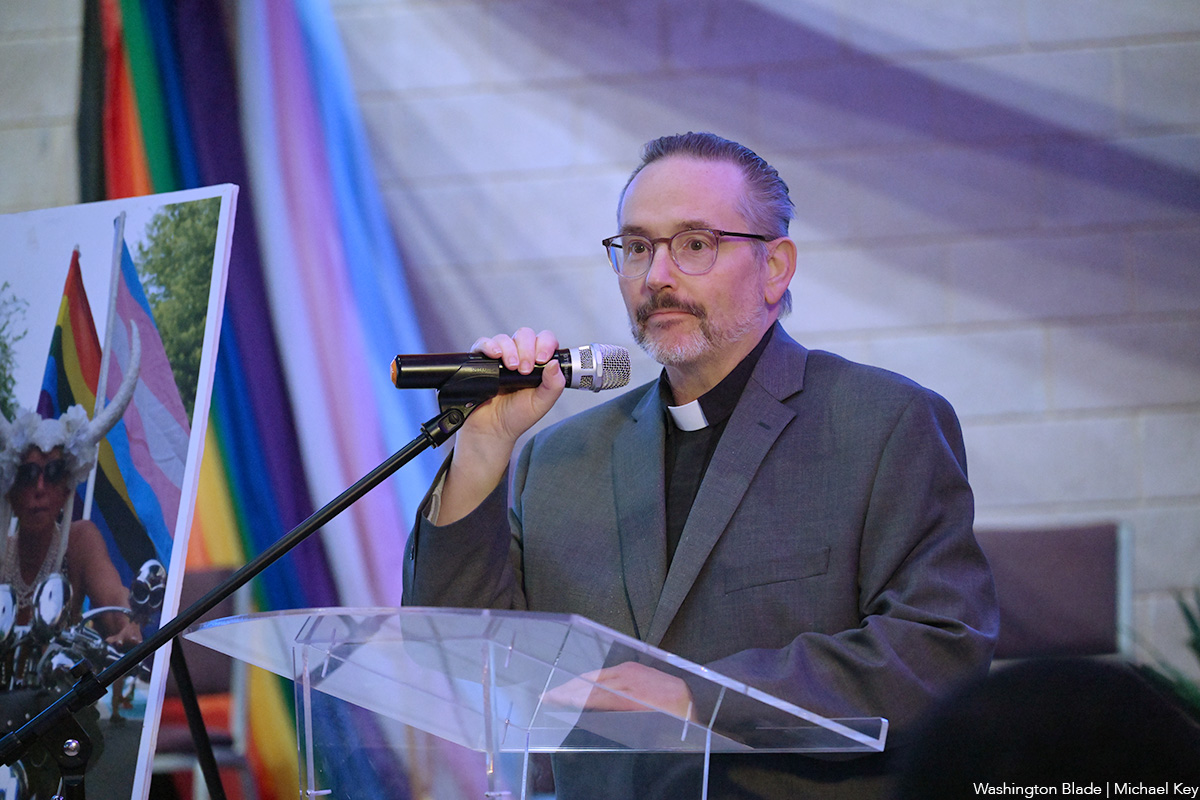
Books
Pioneering gay journalist takes on Trump 2.0 in new book
Nick Benton’s essays appeared in Fall Church News-Press
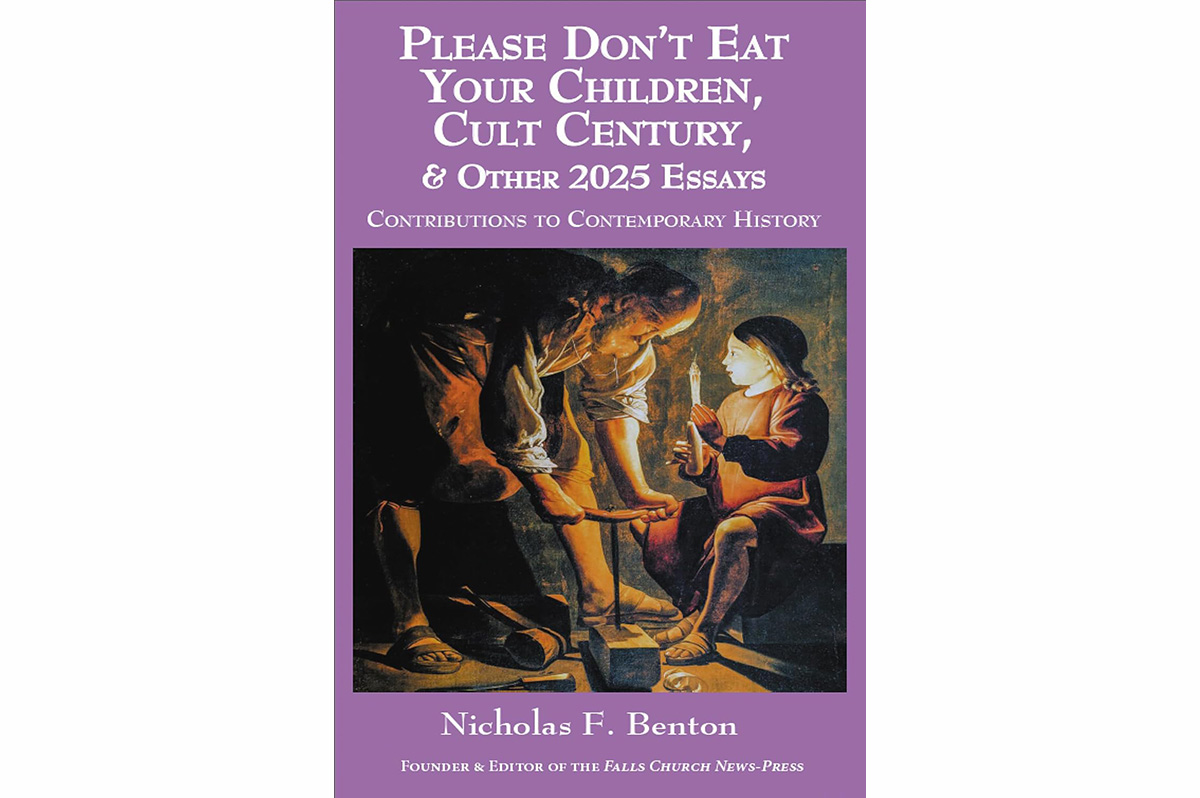
Nicholas Benton is a well-known local LGBTQ advocate and journalist and the longtime owner and editor of the Falls Church News-Press, a weekly newspaper.
In his eighth book out now, Benton offers a new set of remarkable essays all crafted in the first eight months of Trump 2.0 and its wholesale effort at dismantling democracy and the rule of law. Most were published in the Falls Church News-Press, but he adds a new piece to this volume, as an addendum to his “Cult Century” series, revealing for the first time his experiences from decades ago in the political cult of Lyndon LaRouche, aimed at providing a clearer grasp of today’s Cult of Trump.
His “Please Don’t Eat Your Children” set takes off from the satire of Jonathan Swift to explore society’s critical role of drumming creativity out of the young.

Below is an excerpt from “Please Don’t Eat Your Children, Cult Century, and other 2025 Essays.”
Please Don’t Eat Your Children
In his famous short essay, “A Modest Proposal: For Preventing the Children of Poor People in Ireland From Being a Burden to Their Parents or Country and for Making Them Beneficial to the Public,” author and Anglican priest Jonathan Swift (1667-1745) uses cutting satire to suggest that cannibalism of the young might help solve a battery of social ills.
As we examine our broken society today, it seems to me that reflecting on Swift’s social critique can be quite useful. Now we face a nation filled with anger and division and there is little to suggest any real solutions other than insisting people “don’t do that!” We can start out with the observation that young children, left to their own, are neither hateful nor cruel. How do they get that way later on in their lives? What drives them toward such emotional states and behaviors? It is not a problem only for the margins of society, for the extreme misfits or troubled. It is defining the very center of our culture today. Our divisions are not the cause, but the result of something, and nobody is saying what that is.
Swift doesn’t say what it is in his biting little essay. But it is implied by a context of a lack of bounty, or poverty, on the one hand, and an approach to it characterized by obscenely cruel indifference, on the other. He coined the phrase “useless eaters” in defining his radical solution. In Hitler’s Germany, that term resonated through the death camps and some in our present situation are daring to evoke it again as the current administration pushes radical cuts in Medicaid funding.
But while that refers to the old and infirm, mostly, it is the young we are talking about here. The problem is that our society is structured to devour our young and as they begin to find that out, they rebel. Not in all cases is this the practice, of course. Where there is little or no lack, things are different. We nurture our young, as we should, and we love them. Lucky is the child who is born to parents who are of means, and in a community where nurture is possible and valued. But even such children are ultimately not immune from facing a destiny of pale conformity battered by tightly delimited social expectations and debt slavery. If they have enough ambition, education and doors opened for them, some can run the gauntlet with relative effectiveness. Otherwise, our young are raised to die on battlefields, or to struggle in myriad other painful social conflicts aimed at advancing the world of their elders. In the Bible, there is a great admonition against this process that comes at the very precondition for the tradition it represents that begins with Abraham.
It is in the book of Genesis at the beginning of the Biblical story when, as that story goes, God commanded Abraham to kill his son, Isaac, as a sacrifice. As Abraham is about to obey, God steps in and says no. The entire subsequent eons-long struggle to realize Abraham’s commission by God to make a great nation that would be a light to the world would have been cut short right then if Abraham had slain his own son. The message is that all of the Abrahamic traditions, Judaism, Islam and Christianity, owe their source, and in fact are rooted, in God’s command to reject the sacrifice of children to the whims of their elders. The last thousands of years can be best defined in these terms, where nurture is pitted against exploitation of our young with, at best, vastly mixed results. Scenes like that at the opening of “All Quiet on the Western Front,” the World War I novel and film where a teacher rallies a classroom full of boys to enlist in the war, is bone chilling. Or, the lyric in Pink Floyd’s iconic song, Comfortably Numb, “When I was a child, I caught a fleeting glimpse out of the corner of my eye. I turned to look but it was gone. I cannot put my finger on it now. The child is grown, the dream is gone.”
Nick Benton’s new book is available now at Amazon.
The Blade may receive commissions from qualifying purchases made via this post.
Theater
New take on ‘Some Like It Hot’ offers diverse casting
National Theatre production includes non-binary character
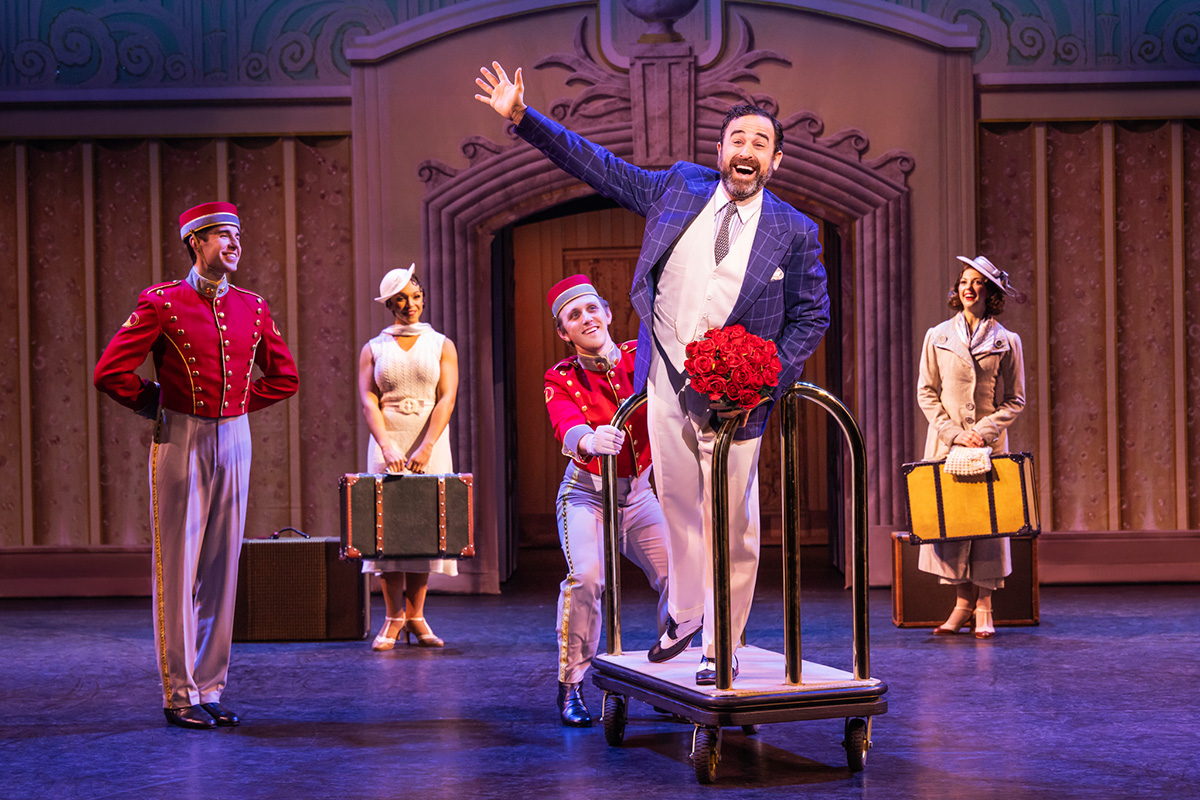
‘Some Like It Hot’
Nov. 25 – Dec. 7
The National Theatre
1321 Pennsylvania Ave., N.W.
Tickets starting at $67
Broadwayatthenational.com
For more than a year, out actor Edward Juvier has been part of the national tour of “Some Like It Hot,” the musical adaption of the 1959 classic comedy starring Marilyn Monroe and written and directed by Billy Wilder.
Juvier, 49, plays Osgood Fielding III, a cheery millionaire in Depression-era America.
With music by Marc Shaiman, lyrics by Scott Wittman and Shaiman, and a book by Matthew López and Amber Ruffin, the 2022 musical is quite different as well with diverse casting, increasingly complicated backstories, and a non-binary character (Daphne).
A talented tenor and Houston native, Juvier is a Cuban American who’s been working in musical theater since graduating from the Boston Conservatory in 2000.
“I personally love touring,” says Juvier. “I like the life on the road and visiting these old theater houses across the country. Seeing the locals that I remember and my friends and family that live all over. For me, a transient life is great. Maybe not so great for others.”
Early in his career, he toured with “Phantom of the Opera” for six years. He began in the ensemble and covered two principal roles, and moved to swing which gave him the longevity covering 11 different roles in that show, a life-changing gig that he remembers fondly.
WASHINGTON BLADE: As a gay actor touring in a hot musical with some queer themes do you feel that you make an impact?
EDWARD JUVIER: Oh yeah, it’s important for queer people to see representation on stage. Our version of the show is a sneak attack; it doesn’t hit you over the head with themes. Seeing an old story that takes a turn where you’re left to accept what’s happening onstage and by that time, you’re in love and rooting with the characters. You feel it from the audiences and we play some of the reddest of states.
Queer, trans, nonbinary people meet us at the stage door in tears thanking us for the representation. They didn’t even know when they came to the show that they’re going to see something with such an affirming message to their lives, and they’re thrilled when they find that out.
BLADE: How were you drawn into musical theater?
JUVIER: I was lucky that my Texas high school made annual trips to New York to see Broadway shows. On one trip, I remember seeing “Will Rogers Follies,” I felt like Keith Carradine was looking and talking right to me.
And the next day, we saw “Falsettos,” the original production. After seeing those two very different shows it was as if I blasted off into the Broadway world.
BLADE: Did “Falsettos,” a musical about AIDS, resonate with you as young gay student?
JUVIER: Absolutely. It shook me to the core.
BLADE: Has being gay made you a better actor?
JUVIER: I think what makes a great actor is somebody who has enormous empathy, able to put themselves in someone else’s shoes, and what better than a queer artist to be able to empathize.
I came out pre- “Will and Grace.” A different time to be coming out than it is now, which shows immense progress but also put us through challenges. It’s been a part of my journey.
I’m lucky to have the best, most supportive family. No Trumpers to deal with when I go home for the holidays. So, I’m grateful for that especially at this time of year.
BLADE: How do you approach a comic character like Osgood.
JUVIER: I approach him with honesty and simplicity and try to get out of the way of cheap jokes.
When I’m feeling that I’m pushing myself I remind myself to just say the words. I think the musical is so beautifully crafted in a way to brings the show to a new audience. Changes aren’t a diss on the original but the world has changed.
BLADE: Are you a big fan of the original?
JUIVIER: I respect the original. It’s been with me all my life especially being a queer artist. We grew up watching “Some Like It Hot.” This takes old themes and jokes that don’t land so well and brings it to a new audience.
Particularly with my role played originally and so brilliantly by famed comedian Joe E. Brown. In the movie he’s not a multi-dimensional character. He’s more of an old, rich pervy guy. That’s just how it was back then. And I’ve had the great privilege to play him differently.
-

 District of Columbia3 days ago
District of Columbia3 days agoNew LGBTQ bar Rush set to debut
-

 Virginia5 days ago
Virginia5 days agoRepealing marriage amendment among Va. House Democrats’ 2026 legislative priorities
-

 Opinions3 days ago
Opinions3 days agoMTG should keep up the pressure on Trump, MAGA
-

 Eswatini4 days ago
Eswatini4 days agoPEPFAR delivers first doses of groundbreaking HIV prevention drug to two African countries




















